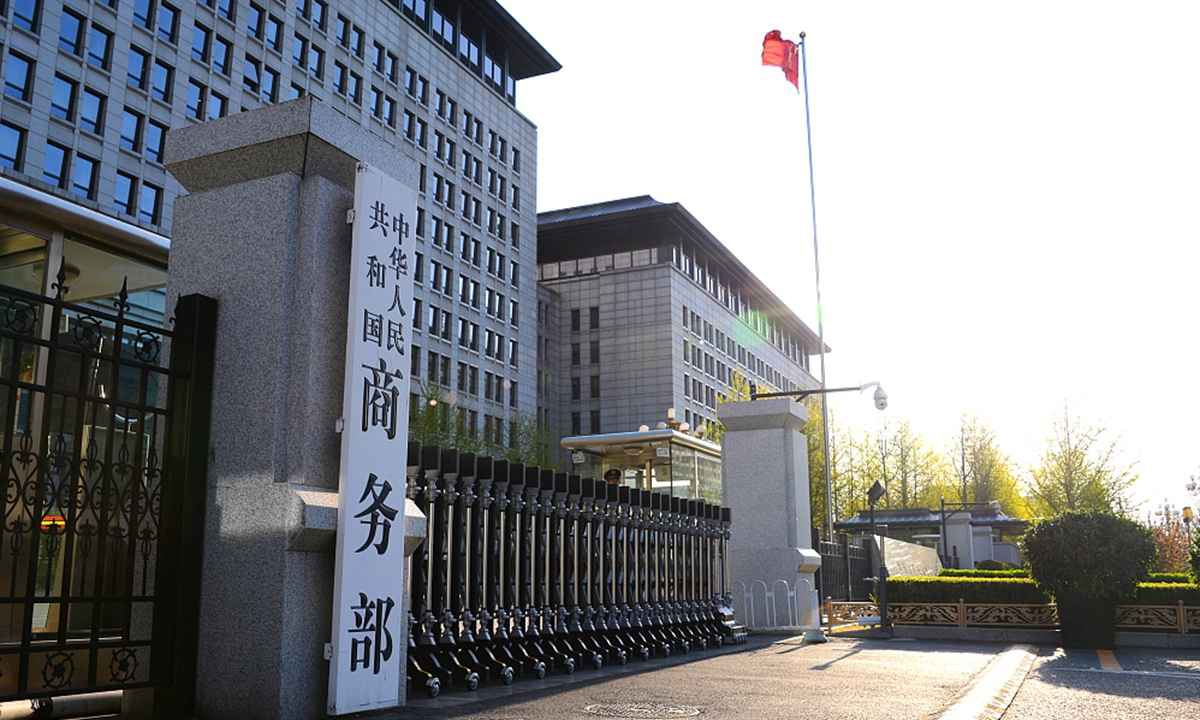
The Ministry of Commerce Photo: VCG
China's Ministry of Commerce (MOFCOM) and the General Administration of Customs announced on Thursday the joint decision to impose export controls on antimony and related items. This measure aims to further protect China's national security and interests and fulfill the nation's international non-proliferation obligations, according to the statement.
The measure will take effect from September 15.
Responding to media questions about the new restrictions, a spokesperson of the MOFCOM said on Thursday that implementing export controls on antimony, superhard materials and related items is an internationally accepted practice.
As an important non-renewable resource, antimony is widely used across industries including electronics, solar photovoltaic components, telecommunications, petrochemicals, vehicles, aerospace and the military.
A superhard material is a material with a hardness value exceeding 40 gigapascals when measured by the Vickers hardness test.
The MOFCOM spokesperson said that China is following international practices and implementing export controls based on its own needs to better protect national security and fulfill its international non-proliferation obligations.
The policy does not target any specific country or region, and exports that meet the relevant regulations will be permitted, according to the MOFCOM.
The spokesperson also emphasized that the Chinese government is committed to maintaining world peace and regional stability, ensuring the security of global industrial and supply chains, and promoting compliant trade development.
Additionally, China opposes any use of controlled items exported from the country for activities that undermine its sovereignty, security and development interests, the spokesperson further noted.
"Some rare minerals are related to national security because they have dual-use applications, serving both military and civilian purposes," He Weiwen, a senior fellow at the Center for China and Globalization, told the Global Times on Thursday. He noted that implementing restrictions is necessary to ensure China's national security and fulfill its international responsibilities, reflecting China's commitment as a responsible major power.
Export controls do not mean a complete ban since applications that meet the requirements will be considered.
According to the announcement, exporters should handle export license procedures according to relevant regulations and apply to the MOFCOM through provincial-level commerce departments.
The MOFCOM will review application documents upon receipt and make an assessment in conjunction with relevant departments before either granting or denying a license within the designated timeframe.
Entities that export without permission, exceed the scope of the license, or engage in other illegal activities will face administrative penalties imposed by the MOFCOM or customs authorities according to relevant laws and regulations.
Export controls are a common international practice, and this approach is consistent with previous measures on certain raw materials. These materials are not banned from export; rather, their destinations and potential impacts must be carefully assessed and analyzed, in line with international norms," Zhou Mi, a senior research fellow at the Chinese Academy of International Trade and Economic Cooperation, told the Global Times on Thursday.
Zhou noted that the export controls on antimony and related items reflect China's need to manage its significant role as the world's second-largest economy in international trade more responsibly.
"The controls stem from security concerns, as some elements may be misused by certain countries or regions, threatening global stability. The aim is to address gaps in international trade while enhancing China's security measures," Zhou said.
This is not China's first instance of imposing export controls on minerals and related products. In July, China adjusted its drone export controls. In May, it introduced controls on equipment, software and technology related to aerospace structures and engines.
Beginning in December 2023, graphite items were also subject to export controls.




